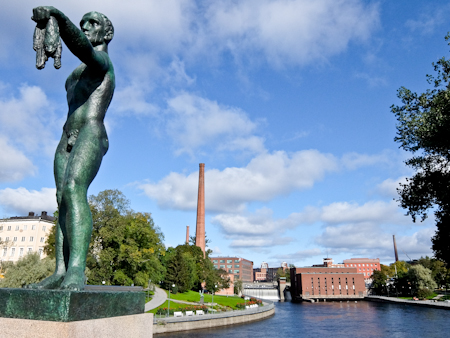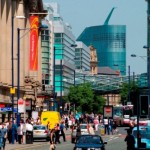In his guide to Tampere, Rupert Parker travels to Finland’s second most important city, once dubbed the Nordic Manchester
Tampere is around 100 miles north of Helsinki and is the third-largest city in Finland. It’s attractively situated on the Tammerkoski rapids, between two large lakes, and it was the water power here that attracted Scottish engineer James Finlayson. In 1820 he started the industrial revolution in Finland, opening a factory manufacturing heavy machinery.
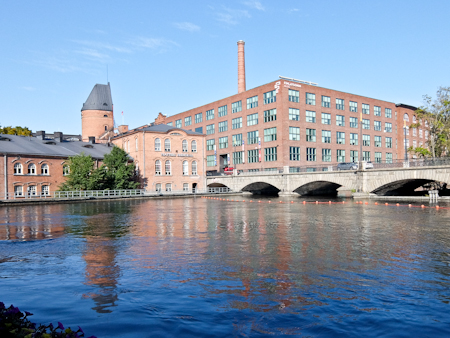
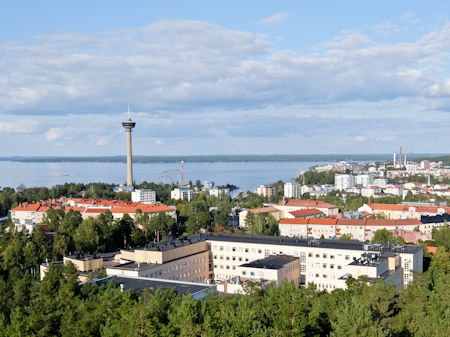
By 1828 he’d switched to textiles and the town became known as the Nordic Manchester. It shared many similarities with its English counterpart and the conditions of the thousands of workers were not much better. Today the mills are almost all gone, but the buildings have been artfully preserved and filled with shops, museums, bars and restaurants. It’s a city built on water with the green banks providing a counterpoint to the red-brick industrial buildings.
In the huge complex that was once the Finlayson cotton mill, the Werstas Museum has the history of the Finnish textile industry with 25 machines on displays, hundreds of objects and photos related to the history of the factories as well as items produced by the Tampere textile industry. Pride of place is the Sulzer steam engine that’s still in its location, in the heart of the original mill. It dates from 1900 and is the biggest steam engine ever used in Finland.
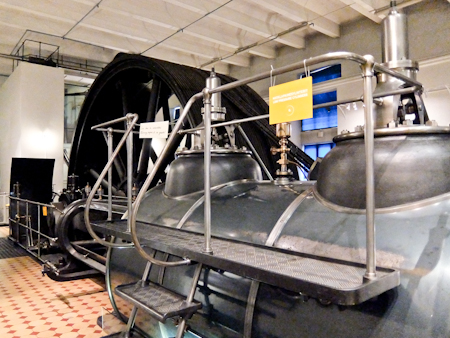
After the Russian Revolution, Finland became independent and the town was at the centre of the brutal civil war between the workers’ movement, the reds, and the conservative landowners and industrialists, the whites. The Battle for Tampere in 1918, with 300,000 soldiers involved, was one of the most decisive military engagements of the war.
In the museum, black and white photographs bring back the carnage and show parts of the city in ruin. With the help of German troops, the Whites won the battle and eventually the war. The losers were the workers and, even now, it’s an event that still divides families.
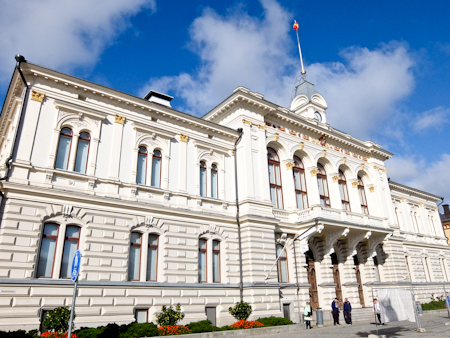
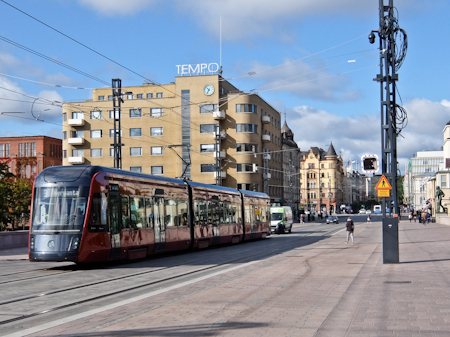
Tampere is not all about industrial heritage and the spacious wide-open Central Square is the heart of the city. It was built when Tampere was Russian and the influence is obvious in the architecture. On the East is the Tampere Theatre built in 1912 and opposite is the grand neo-Renaissance Old Town Hall, still used for festive occasions. Art Nouveau buildings make up the South side and in winter the square is home to a famous Christmas market.
Echoing the city’s Russian past are the seven cupolas of the Byzantine Orthodox church, known locally as the “Onion Church”, the inside covered in icons. There’s only a small orthodox population and the nearby Lutheran Cathedral is the place of worship for most churchgoers. It’s a great example of the Finnish national romantic style and what’s most striking are the murals by Hugo Simberg. They created a furore back in 1907 and it’s easy to see why – the Garland of Life depicts twelve giant-sized naked boys, spaced along the gallery walls.
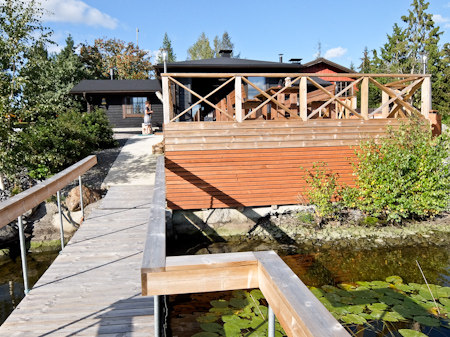
Sauna came to Finland over 2,000 years ago and apparently, there are over three million in the country, more than one for every two Fins. Recognised by UNESCO as part of the country’s intangible cultural heritage, Tampere now designates itself as the Sauna Capital of the World.
Aficionados have a choice of over 50 public saunas in the region, including Kuuma, right next to the Central Square. Upstairs is a café-restaurant with a terrace and below are two saunas, open all year round. When you can’t take the heat, you plunge into the refreshing waters of the Pyhäjärvi Lake, in a corralled pool area.
Of course, the water was an attraction for another industrial complex, based around a paper pulp mill at Mänttä-Vilppula, a beautiful lakeside town, 90 km north-east of Tampere. The founder’s nephew, Gösta Serlachius amassed a unique art collection now on permanent display at Art Museum Gösta on Lake Melasjärvi.
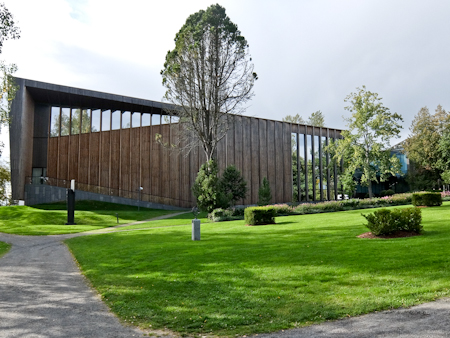
His majestic manor house is home to mainly Finnish artworks but a stunning modern wood pavilion hosts temporary exhibitions, including one dedicated to Banksy, the famous street artist. It’s soon to be replaced but includes over a hundred works borrowed from various collections with well-known examples of the artist’s early production.
Finland has over 188,000 lakes and around 180,000 islands, many located in the Lakeland district, the largest of its kind in Europe, which surrounds Tampere. Imagine a blue labyrinth of lakes, islands, rivers and canals, interspersed with forests and low rise hills.
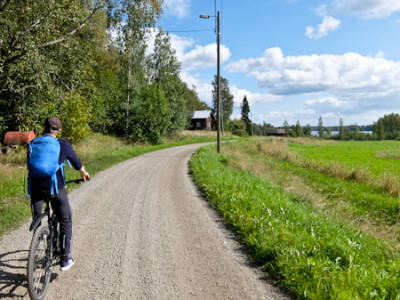
Exploring by e-bike is a great way to get around and the tourist office has devised a number of trails, which link up with ferry services in the summer. For day trips you’ve a choice of the two large lakes, Pyhäjärvi or Näsijärvi, on either side of the city and bike paths follow the lakeshore. Restaurants and tea shops mean you’re never short of refreshments. At the end of a long day in the saddle, there’s nothing better than a sauna for a true Finnish experience.
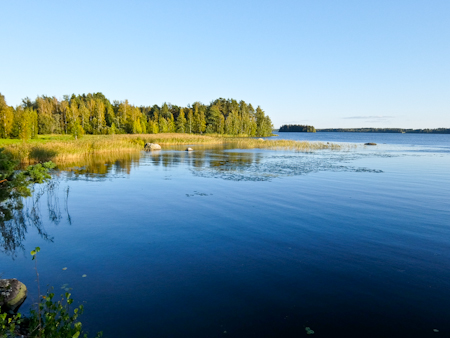
Going south I end up at Lempäälä, as the evening sun is hanging low over Pyhäjärvi Lake. Mikkola is no ordinary sauna but a traditional smoke sauna that they’ve been heating for six hours. There’s no chimney so, as the wood burns, smoke fills the room. When it reaches the appropriate temperature, the fire is extinguished and the room is ventilated.
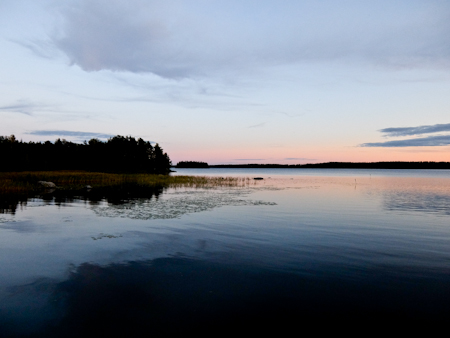
That’s when I step in and salve my weary limbs. The moist heat and steam rise from the stove, mingling with the scents of smoke and tar, and I’m soon at peace. Now the challenge is to rush out and jump naked into the cold lake. Before the sun sets, I summon up all my courage, run along the jetty and plunge into the water.
Tell Me More About this guide to Tampere
Visit Tampere has information about this guide to Tampere and the city.
Visit Finland has information about the country and more on this guide to Tampere.
Ryanair will fly direct from London Stansted to Tampere from November 2021
Radisson Blu Grand Hotel Tammer is a comfortable base right in the centre of the city.
The Werstas Museum has the largest steam engine in Finland.
Serlachius Museum Gösta is accessible by shuttle bus from Tampere and has an excellent restaurant.
Sauna Restaurant Kuuma has a terrace where you can enjoy its menu.
Ravintola C is near Tampere station and has a multi-course fine dining set menu.
Mikkola Smoke Sauna is around 20 miles south of the city, has space for up to 18 people and serves traditional dishes.

